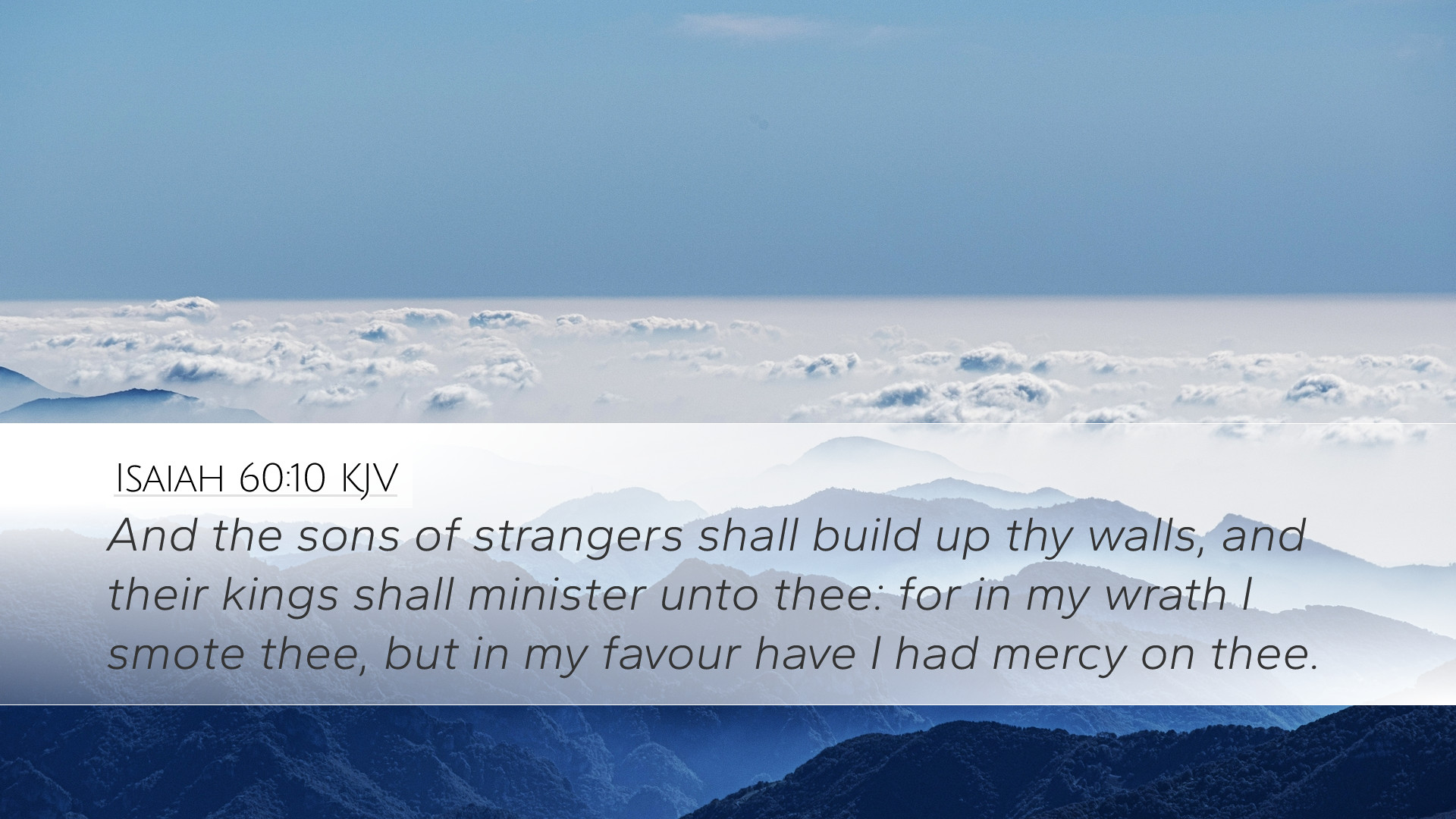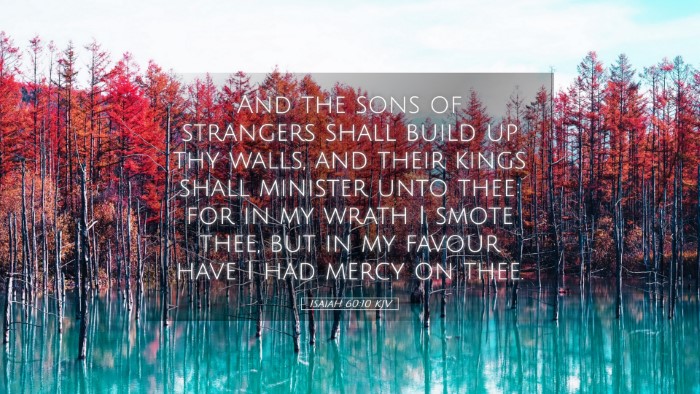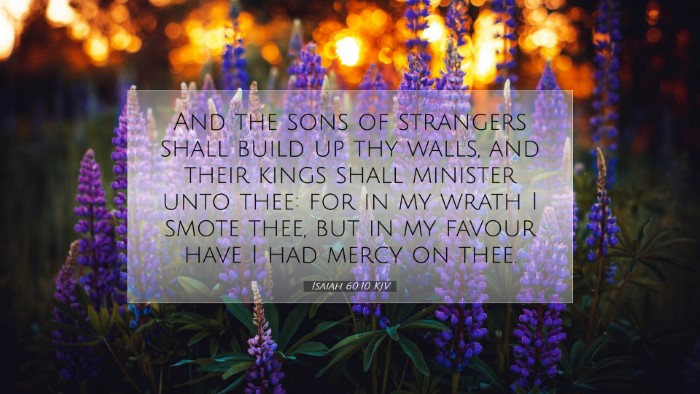Commentary on Isaiah 60:10
In Isaiah 60:10, the prophet Isaiah speaks to the restoration of Israel and the sweeping transformation of the nations in response to God's glory. This verse encapsulates themes of divine favor, restoration, and the unity of God’s people with those who once opposed them. Below, we explore various insights from distinguished public domain commentaries to provide a thorough understanding of this profound verse.
Text of Isaiah 60:10
"And the sons of strangers shall build up thy walls, and their kings shall minister unto thee: for in my wrath I smote thee, but in my favor have I had mercy on thee."
Historical Context
This passage is situated in a period of prophetic vision concerning the future glory of Zion. Isaiah’s prophetic ministry occurred during a time when Israel faced both external threats and internal strife. The subsequent promise of restoration points toward a future where God’s favor would enrich His people through the service of those who once were foreign onlookers to God’s blessings.
Theological Significance
Isaiah 60:10 reveals profound theological implications regarding God’s mercy and the inclusion of the Gentiles in His salvific plan. The shift from judgment to mercy signifies the transformation of not only the people of Israel but also their relationships with surrounding cultures and nations.
Insights from Matthew Henry
Divine Restoration: Matthew Henry explains that the “sons of strangers” symbolize both the nations and the people who previously harbored animosity toward Israel. In their building of the walls of Jerusalem, there is not only a physical restoration but also a symbolic acknowledgment of the graciousness of God toward those outside the covenant community. This serves as a reminder of God’s universal plan for redemption, which encompasses all nations.
Grace Over Judgment: Henry emphasizes that God’s past wrath was necessary due to the people’s sins; however, His mercy prevails. The transition from judgment to a future of peace illustrates the comprehensive nature of God’s grace. The rebuilding of Jerusalem by foreign nations signifies a turning point: where previous enemies become allies. This reflects God’s intention for unity and reconciliation.
Insights from Albert Barnes
Service of Former Enemies: Albert Barnes stresses the significance of “kings” ministering unto Zion. This powerful image illustrates a complete reversal of circumstances where those who once oppressed or disregarded Israel are now subservient to its divine purposes. This transformation alludes to the greater plan of God’s kingdom, where earthly power is aligned with heavenly will.
Symbolism of Construction: Barnes notes that the act of building up the walls embodies support and protection. The foreign nations’ contributions are symbolic of the commitment to Jerusalem's mission and its future destiny. This suggests an acknowledgment of God’s sovereignty over all nations and invites reflection on how external entities can play a role in the unfolding of God’s plan.
Insights from Adam Clarke
Engagement with the Nations: Clarke highlights the theme of God’s acceptance and inclusion of the Gentiles in His divine plan. The phrase “the sons of strangers” transcends mere construction; it speaks to a spiritual solidarity and fellowship that God extends to all who align with His purposes. The nations participating in Israel’s restoration signify a prophetic foreshadowing of the church’s mission to all peoples.
Mercy Defined: Clarke elaborates on God’s mercy, illustrating that it is neither earned nor deserved. He identifies that the context of divine wrath serves to magnify the glory of God’s mercy, reminding the faithful that hope exists even amidst judgment. The verse encapsulates the core biblical narrative of redemption—alluding to Christ’s redemptive work that would ultimately extend to all nations.
Meditation on Unity and Restoration
The reflection on Isaiah 60:10 compels the church today to consider its engagement with the world. Politically and socially, the church finds itself in a similar position as Israel, facing both outside hostility and internal challenges. The promise of divine restoration encourages a vision of hope where reconciliation can thrive.
Application for Pastors and Theologians
- Emphasizing Divine Mercy: Pastors are encouraged to highlight God’s mercy in their teachings, promoting an understanding that none are beyond His reach. This should inspire congregations to embrace outsiders and extend grace.
- Encouraging Unity: The unity of God’s people is paramount, mirroring the promise where even enemies can become allies. Churches should foster environments that reflect inclusivity and collaboration across denominational and cultural lines.
- Kingdom Perspective: The involvement of nations in the rebuilding of Jerusalem can inform a kingdom-focused perspective in ministry that seeks to engage and transform society at large through God’s love and grace.
- Hopeful Vision: Leaders should cultivate hope in their communities, reminding them of the divine promise of restoration and the visions of good to come, inviting the faithful to participate in God's ongoing work in the world.
Conclusion
Isaiah 60:10 serves not merely as a promise to Israel but as an expansive vision for all of humanity. Through the insights provided by historical commentaries, we witness a tapestry woven with themes of restoration, divine mercy, and the invitation of all nations to participate in God’s redemptive work. These reflections illuminate pathways for our understanding, teaching, and living out the gospel in a complex and often divided world.


